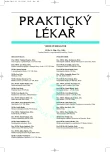-
Medical journals
- Career
Red blood cells transfusion in critically ill from the point of view of evidence based medicine: new limits, new risks?
Authors: I. Herold
Authors‘ workplace: Oblastní nemocnice Mladá Boleslav, a. s. nemocnice Středočeského kraje ; Anesteziologicko-resuscitační oddělení
Published in: Prakt. Lék. 2006; 86(9): 494-498
Category: Various Specialization
Overview
Administration of red blood cells to critically ill patients is among the most frequent therapeutic interventions in ICU setting. Anaemia is caused not only by bleeding, but is frequently associated with severe sepsis accompanied with down regulation of erythropoietin production, functional iron deficiency and shorter red blood cells lifespan. Daily routine blood samplings further contribute to severity of anaemia. Results of experimental studies, case reports of Jehovah Witnesses and in healthy volunteers suggest that under normovolemic conditions patients with normal cardiovascular status can sustain very low haemoglobin concentrations.
Results of several recent observational studies suggest that restrictive approach to RBC administration with lower transfusion threshold (haemoglobin of 70g/l) may be associated with better outcome and lower mortality. Higher threshold is required only in patients with severe co-morbidities, mostly in patients with unstable coronary artery disease and acute myocardial infarction (80-90g/l). The potential for adverse role of RBC older than 3 weeks is frequently discussed. Surprisingly, the results of recent studies did not confirm the negative influence of RBC stored over 3 weeks on the outcome. Serious post transfusion complications might be associated with residuals of leukocytes and of plasma. Introduction of RBC leukodepletion diminished the extent of adverse events associated with immunomodulation (TRIM). Next to severe haemolytic reactions caused by ABO incompatibility due to clerical errors, the most important adverse reaction to RBC is TRALI (transfusion-related acute lung injury). Contrary to ALI (acute lung injury), it is usually associated with better outcome. The future role of fresh whole blood transfusion with full coagulation activity in extensive injuries under extreme conditions obtained from pre-screened donors (walking blood banks) is finally discussed.Key words:
red blood cell transfusion, anaemia, transfusion threshold, critically ill patients, erythropoietin, leukodepletion, TRALI, fresh whole blood.
Labels
General practitioner for children and adolescents General practitioner for adults
Article was published inGeneral Practitioner

2006 Issue 9-
All articles in this issue
- Prevention of diseases using modern information technologies – interactive web pages and their effect
- Emergency resuscitation in the front line
- Red blood cells transfusion in critically ill from the point of view of evidence based medicine: new limits, new risks?
- What have the new recommendations for cardiovascular disease prevention in adults taught us – is it necessary to recalculate a previously assessed risk?
- Tandem Heart used for treatment of the most severe forms of heart failure – left ventricular support
- Chronic viral hepatitises and their health and social aspects at general practitioner
- Epiglotitis – The Experience with patients hospitalized in RES FN Motol
- News in treatment modalities of hypertension
- Non-setroidal anti-inflammatory drugs – use in treatment of cardiovascular disease an cardiovascular risks
- Oral anticoagulant therapy
- General Practitioner
- Journal archive
- Current issue
- Online only
- About the journal
Most read in this issue- Tandem Heart used for treatment of the most severe forms of heart failure – left ventricular support
- Oral anticoagulant therapy
- Epiglotitis – The Experience with patients hospitalized in RES FN Motol
- Non-setroidal anti-inflammatory drugs – use in treatment of cardiovascular disease an cardiovascular risks
Login#ADS_BOTTOM_SCRIPTS#Forgotten passwordEnter the email address that you registered with. We will send you instructions on how to set a new password.
- Career

